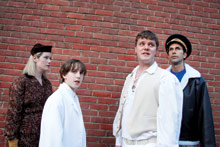Will a production of The Who’s Tommy, the staged rock opera based on the album of the same name, bring about a resurgence of pinball wizards and boardwalk-style arcades lined with the chiming, flashing games?

“The Bier Garden has a pinball machine in the back of their arcade room,” says Michael Wilson who plays the lead role in the local show. “I hung out with it a little.” And, in the performance—co-produced by Asheville Arts Center’s Heather Taft and BioFlyer Productions’ Paul “Rock” Eblen—Wilson actually rides on two machines. There’s even a point in the show when the cast, armed with yoga balls, acts out the inner-workings of a pinball game.
“At our first rehearsal we talked about people and gaming,” Wilson says. That is, modern gaming—those stylus-driven, hand-held devices—versus the knobs, ruckus and occasional brawls inherent to the games of yore.
“It’s weird that pinball machines are now old-fashioned,” Taft says. But neither she nor Wilson imagine that this show will bring the retro past time back into popularity. What they do think will make Tommy a hit with Asheville theatergoers is the classic rock soundtrack.
“The music pulls it all together,” Taft says.
Wilson adds that the song list is “timeless.” Sure, “See Me, Feel Me” sends us all (even those of us who were never there in the first place) back to 1969—but that’s exactly what saves the musical (first opened in San Diego in 1992) from the modernizations that plague other productions like Hair. (West Side Story, Gypsy and Pal Joey are also being considered for contemporary facelifts.)
Tommy (which also features Kelli Mullinex as Mrs. Walker, 13 year-old Gabe Gibson as young Tommy and Margaret Evans as the Acid Queen) is different from the typical corny-cutesy musical (South Pacific; The Music Man) because it appeals to those baby boomers who attended Woodstock and their children and grandchildren weaned on the hits of rock’s golden era. It’s fast-paced—“rock opera” means there’s no talking, just singing.
As Taft says: “This isn’t Oklahoma.”
But there are other elements that might appeal to Asheville’s eclectic audience, such as the musical’s spiritual side. The Who’s 1969 record was dedicated to Indian guru Meher Baba, who died that same year. Meher Baba was known for coining the phrase “Don’t worry, be happy,” and for his decades-long vow of silence. That Tommy‘s main character is mute (as well as blind and deaf) is no coincidence. In fact, Wilson (who has also been cast in “messiah” roles like the title character in Jesus Christ Superstar and Hair‘s Berger) muses that Tommy is “about a person trying to find enlightenment. It’s about how the general person might feel deaf and dumb to reality.”
He adds, “The transcendental theme drew me to it.”
For those unfamiliar with the story, a young boy witnesses his father (a returned soldier, previously presumed dead) murder his mother’s lover. To cope, the boy enters a catatonic state. Later, molestation by a relative drives Tommy further into himself. The only thing that seems to connect him to the outside world is his proclivity for pinball.
Taft points out that the production to be staged at Diana Wortham Theatre downplays the molestation issue, and the accompanying song, “Fiddle About,” has been cut. Still, parents should consider the nature of the play before bringing young children; this is a departure from many previous Asheville Arts Center ventures.
“Most people think of kids with Asheville Arts Center,” Taft says. “We like that, but we’re moving toward more adult productions. We’d like to produce four times a year at Diana Wortham Theatre.” In February, the center presented its first musical foray: Into the Woods. The team effort with Eblen—who has also worked on local stagings of Jesus Christ Superstar and Rockula! A Very Vampire Musical—sets a precedent for future musical numbers, though audiences should expect shows to be more Tommy, less Disney.
who: The Who’s Tommy
what: Rock opera
where: Diana Wortham Theatre
when: Thursday, May 14, to Sunday, May 17 (Thursday through Saturday at 8 p.m.; Sunday at 2 p.m. $25. 257-4530 or www.dwtheatre.com.)



the accompanying song, “Fiddle About,” has been cut
And this is justified how?
The author of TOMMY gives permission in the royalty contract to omit “Fiddle About” for productions associated with schools, and the Asheville Arts Center families are a large part of our audience.
I’m not questioning the legality of it, merely the choice itself. I mean, it was in the 1975 film version, which was rated PG. I’m also pretty sure it was in the Jericho/Blue Ridge Community College production in 2007. Moreover, since part of the impetus behind Townshend’s original had to do with abuse he suffered as a child, it seems a fairly significant omission.
Ms. Marshall’s comment [“modernizations that plague other productions like Hair. (West Side Story, Gypsy and Pal Joey are also being considered for contemporary facelifts.)]is puzzling. Rather than “plaguing” them, recent Broadway revivals of such musicals as Hair, West Side Story, Gypsy, South Pacific, and, yes, even the unjustly maligned Oklahoma, these reinterpretations have invigorated those shows and have been greeted with acclaim by both critics and audiences. Ms. Marshall needs to consult with the Mountain Express’s new, knowledgeable theatre reviewer, Steven Samuels.